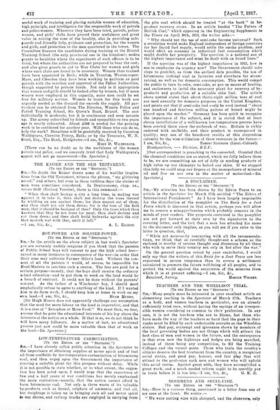BOY-POWER AND SOLDIER-POWER.
[To THE EDITOR OF THE SPECTATOR."]
Sin,—In the article on the above subject in last week's Spectator you are certainly unduly sanguine if you think that the parents of Public School boys will consent to pay the high school fees— raised in many instances in consequence of the war—in order that their sons may cultivate Farmer Giles's land. Without the con- sent of all the parents it would, of course, be impossible for Head-Masters to sanction such a course. The fees are paid for a certain purpose—namely, that the boys shall receive the ordinary school education—and to put them to work on the land would be a breach of contract. It could not be done without the parents' consent. As the father of a Winchester boy, I should most emphatically refuse to agree to anything of the kind. If I wanted him to do farm work, I should keep him at home to work on my [Sir Hugh Munro does not apparently challenge our assumption that the need for more labour on the land is imperative, and that it is a case of " Xenophon or More Food." We must then, we fear, assume that he puts the educational interests of his boy above the interests of the nation as a whole. If that is so, we do not think he will have many followers. As a matter of fact, no educational process just now could be more valuable than that of work on the land.—ED. Spectator.]


























 Previous page
Previous page